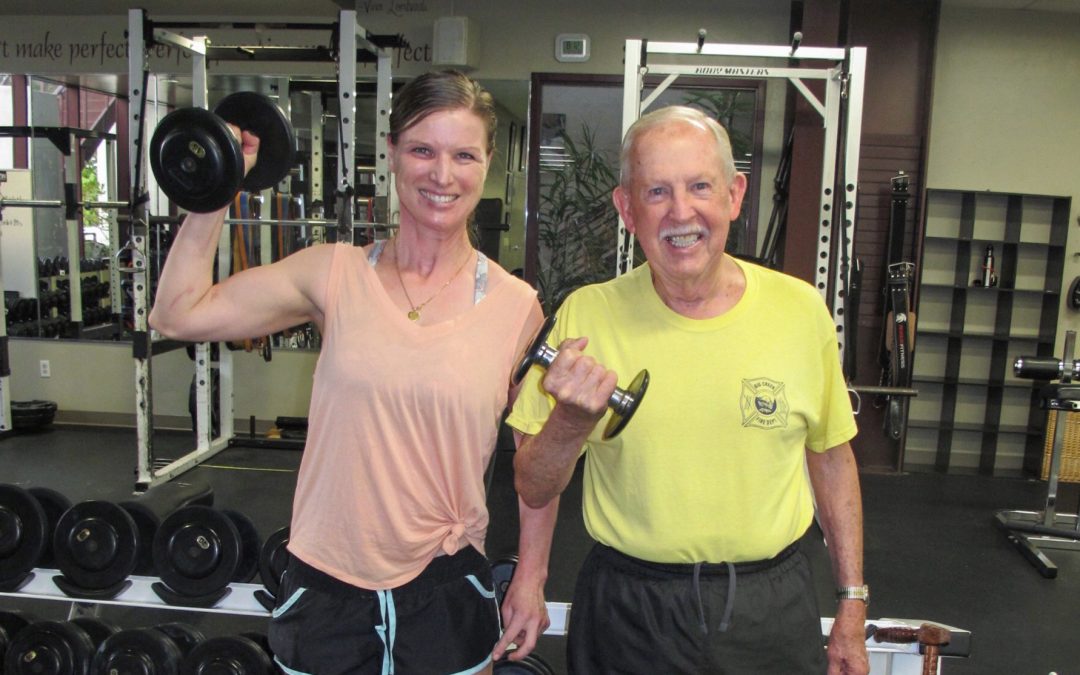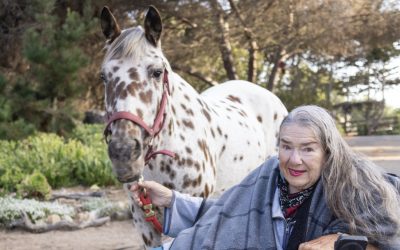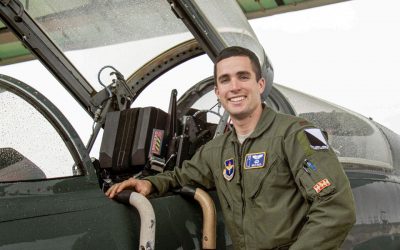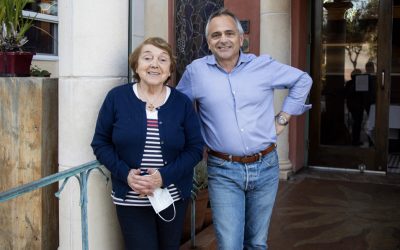She wasn’t expected to live more than 20 minutes. That’s what the doctors told Tara Olson’s frantic parents when they arrived at the hospital shortly after the car crash. But against all the odds, and with a defiance no one expected, this month, Tara and her family will celebrate the 20th anniversary of that hot summer night in 1998 when a Suburban full of teenagers crashed just north of Santa Margarita. A crash that left nine of them with injuries of varying degrees of seriousness…and Tara in a coma.
It would be two agonizing months before she opened her eyes. And for the next two decades, Tara Olson’s life would be one miracle after another, beginning with the first one: that she lived at all. The accident caused a brain injury that left one side of her body seriously impaired and affected her speech and her short-term memory. She could not walk or talk or write and it would be years before these skills would return.
Paul Benson, the physical therapist assigned to her case and who stayed on long after the insurance ran out, even into his retirement, said this: “There wasn’t any one big ‘Hollywood’ moment in Tara’s recovery. It’s been a long, steady slog … a step-by-step journey of small gains that ended up equaling the large gains.”
To this day, Tara works out two to three hours every day. The dedicated athlete she was before the accident (at 18, she was well on her way to becoming a world-class tennis player) shines through. Every person who knows or works with Tara uses a combination of the same three words to describe the character traits that got her through: resilience, perseverance, and tenacity.
“She has amazing persistence,” said Benson, adding yet another synonym to the list. “Plus a strong work ethic. She never gave up. I don’t recall a single time when she backed away from anything I asked of her.”
Over the years, Tara’s parents spared no expense in finding new treatments, therapies, rehab equipment—anything that might help their daughter reach whatever potential she had inside her new body. From healers and new age practitioners to the Brucker Biofeedback Center in Miami Florida, Peaches—Tara’s mother—investigated them all.
“Peaches was the boss,” said Rob Olson, Tara’s father. “I just wrote the checks”— a gross under-statement typical of his humility in all of this.
Early on, Rob and Tara spent hours together every day, reading the newspaper, discussing the news, and planning their day. In addition to learning to walk and talk again, Tara also had to work on her short- term memory. She couldn’t read a book or watch a movie because she couldn’t recall the previous chapter or scene.
While some of the maverick things they tried worked, and some didn’t (there are a lot of quacks out there offering miracles), what made the difference was recognizing that given the chance, the brain will find new pathways to learn how to do things.
“Every day I try to educate myself on things I still struggle with,” she writes. “All things are possible with the right amount of will.”
Today, Tara walks safely on her own; she speaks eloquently about her life both before and after the accident. And she reads voraciously, with thousands of books on her beloved Kindle. And the writing? She not only learned to write again, this time with her right hand since her dominant left hand was affected, she has also become an accom-
plished poet. Seven years after the accident, her poetry showed up in her own column in this very publication, titled “Tara’s Corner.”
“My writing is an unspoken voice,” she explains. “A way for my soul to find freedom.”
She is also quite the tease, joking easily and often. Rob told us that one of the most important gifts you can give a child is a sense of hu- mor, and Tara’s is especially well-developed.
For example, fellow gym-rat and great friend, Larry Sage, says, “Tara’s function is to terrorize me,” describing Tara’s relentless taunting and teasing. It’s her way of showing love and affection for a “worn out old vet” attempting to do yoga in order to stay fit.
“She’s an outstanding human being,” he adds, “And I’m a better man for it.”
At the top of her list of people and things that have contributed to Tara’s success story is her family. “I have an awesome family. I am just the lucky recipient. … My brothers are way cooler than I am,” she says of younger sibs, Levi and Jesse. “But don’t tell them that!”
Currently battling her own health issues, Peaches Olson took a moment to point out the team who has worked together from day one. Who was on that team? “Rob, myself, Tara, and God,” she said. Today, their roles are reversed, as Tara works hard to daily inspire and encourage her mother, mostly by example.
In fact, Tara regularly visits others suffering from a wide variety of brain injuries, hoping her own progress will inspire them. Asked what advice she might give to others who are struggling with adversity in their lives, Tara said, “It’s different for everyone. What I’ve discovered is that imperfection is what makes us individuals. … I don’t think I’d tell them anything because I didn’t listen to anyone. I am not Mother Teresa. All I can do is lead by example and hope it helps.”
Tara’s family celebrates the anniversary of the accident like a birth- day. Rob says it’s because they consider August 4th the day the new Tara was born. The Olsons are a family that loves to celebrate the positive things in their lives.
This past Father’s Day, Tara Jean Olson wrote her Dad a poem, celebrating Rob’s role in her recovery and in her life. In it, she quotes a line from a Clint Eastwood movie: “Dying’s easy for men like you and me; it’s the living that’s hard.”
The Olsons understand that better than most. But for the girl—now a lovely young woman—who was not expected to live for another 20 minutes, 20 years of hard work and hard living just might merit the celebration of the century.
On Pacific Time.
Always open.
Email or call
805-466-2585
Loving Life on the
Central Coast, California
On Pacific time.
Always open.
Email or call
805-466-2585





